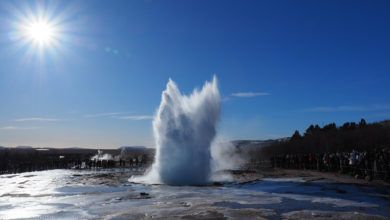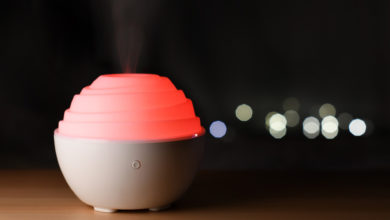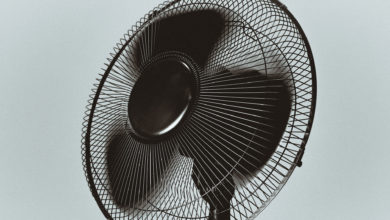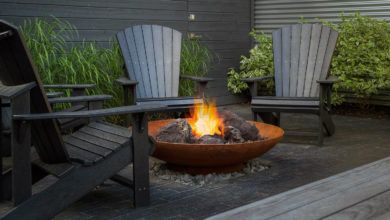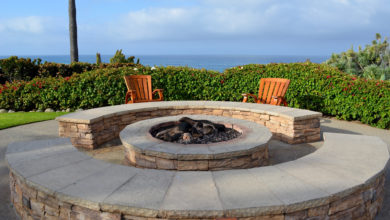An outdoor kitchen is a space in your backyard or patio where meals can be prepared and served. It can be a simple space with the most basic grilling equipment and kitchen appliance or an elaborate space done up with state-of-the-art kitchen equipment and utensils. Outdoor kitchens are becoming the in-thing with homeowners and are even considered a necessary addition for those who live in warmer climates. Before you knock the idea of having an outdoor kitchen for whatever reason, let’s consider some of its advantages…
- It makes entertaining easier, more convenient and more fun: When you are entertaining friends or family, you’ll find it more convenient, fun and easier to have your guests gather around the grill and socialize outdoors while you cook. It can’t be the same with an indoor kitchen because all your guests cannot fit into your kitchen; unless it’s an intimate party for two or less than a dozen guests.
- Adds additional space to your home: You have the advantage of extra space without building a room with walls; your patio or backyard is already available, all you need to do is bring in the appliances you need and voila! You have extra space for entertainment, family hangouts and get together.
- Increases the value of your home: Considering the cost of putting up the structures or appliances that would make your outdoor kitchen, you may be tempted to pass on the project. But consider that most of the appliances that are used in outdoor kitchens are stainless steel and they last for a very long time. This is a good investment that adds value to your home in case you want to sell it. Even if you feel you would never sell your home, you would be able to use your outdoor kitchen for years to come and that’s a great advantage.
- Keeps smell and bad odor out of your home: While most of us enjoy seafood and some smoked and spicy food, we can testify that it’s difficult to get the odor out of the house. Outdoor kitchens help to keep your house smelling fresh and nice. You don’t have to deny yourself the pleasure of cooking and serving any type of food you want just because of the smell. The outdoors ensure that every bad smell is dissipated, leaving you to enjoy your meal without thinking of how long it would take you to air out your house.
- Helps you save on utility bills: When you prepare your grills or cook a large quantity of food indoor, the heat level of the house goes up. This causes the air conditioner to work harder to cool the house and this would also impact on your bills. But when you do the majority of your cooking outdoors, your house is cooler and your utility bill is lower. This is especially great for the sweltering heat of the summer months.
- Gives you the freedom to experiment with recipes: There are some recipes that may be a bit dicey to prepare indoors but are just right for open flame or grills. With an outdoor kitchen, you have the freedom to experiment with all kinds of recipes; this removes the boredom and tedium of cooking, serving and eating the same type of meals all the time.
- Allows you to prepare healthier meals and maintain a healthy eating habit: Grilled food has been noted to be healthier than fried food. When you grill food, the heat helps to drain the fat, making it less greasy while retaining its moisture and taste. If you are on diet or have to make some lifestyle adjustments for health reasons, an outdoor kitchen would come in handy. You can easily prepare your grilled meals and food that require open fire without stress.
- Helps you to save money: Many people choose to eat out from time to time because home cooking can become boring. With only an indoor kitchen, there are limitations to what one can prepare but with the combination of an indoor and outdoor kitchen, the possibilities are endless. This ensures that you can always experiment and whip up different culinary delights that greatly reduce the need for eating out.
- Helps families to build memories together: Thanksgiving, Christmas, birthdays, anniversaries and other memorable occasions can be spent together in an outdoor kitchen. Close family bonds are built and no one feels left out because everyone can gather around the cook while food preparation is going on. Family traditions are also established around the grill and barbecue table.
- Your appliance lasts longer: Equipment like air conditioners have to work extra hard during the hot season. Now imagine the extra input that would be needed if you light up a grill indoors! An outdoor kitchen would give your air conditioners the much need rest when you take your cooking outside, helping them last longer. There are also some household appliances that don’t do well in heat; with an outdoor kitchen, the level of heat in your home is greatly reduced. The overall effect would be that those types of equipment would last longer.
- Aesthetic Value: An outdoor kitchen would add aesthetic value to your home. It gives you the freedom to run wild with your imagination. Since you do not have the restriction of walls and bricks, you can flow with any theme or style that you want. What’s more? You can work with any budget at your disposal.
- Ease for outdoor cooking: With an outdoor kitchen, your cooking is made easier and more convenient. This is because you have all the appliances and utensils you need at your disposal as opposed to just having your grill oven outside. You wouldn’t need to be going back and forth to your indoor kitchen to get the things you need when cooking outdoors.
Conclusion
From all that we have discussed, some people living in colder climates may feel that an outdoor kitchen is not for them. What with the inclement and harsh weather, you may feel that you’ll be unable to enjoy these benefits. Not so; there are many designs for outdoor kitchens and you would surely find one that would make it possible for you to have protection from harsh winds and other weather conditions. Also, remember that outdoor kitchen appliances are mainly stainless steel that can withstand all kinds of weather conditions.
Depending on the space and funds available to you, you can either choose to work with a professional designer or to do it yourself. Whatever you decide just to ensure that you are afforded the full benefits of an outdoor kitchen.

